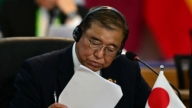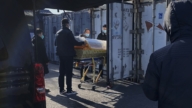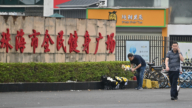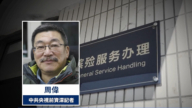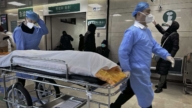【新唐人2011年10月26日讯】中共人大常委会10月24号初次审议《精神卫生法》草案,根据这一草案,送非精神病患者进医疗机构,将被追究法律责任。多年来,大量的访民、法轮功学员、甚至维权律师被送进精神病院遭受迫害。法律专家指出,这一《草案》难以制止广泛存在的“被精神病”现象。
中共卫生部长陈竺24号承认,目前在精神卫生方面存在三大突出问题,包括:精神病患者的合法权益没有得到保障,强制收治的程序存在缺失,导致“被精神病”事件不时成为舆论热点。
今年4月,中国上演了真实版的“飞越疯人院”,武钢职工徐武与单位打官司,却被送进精神病院,收治4年多后出逃到广州,引起全国公众关注。而此前的“徐林东案”、“彭宝泉案”也为社会重新关注。
无偿代理徐武“被精神病案”的著名公益律师黄雪涛,接受本台采访指出,滥用精神病收治在中国广泛存在。
深圳衡平机构负责人黄雪涛律师:“因为过去十几年来,中国整个精神病领域所运行的一套模式,都是否定精神病人拒绝住院的权利。在这么样一套有瑕疵的理论影响下,各个地方的一些立法,还有影响到全国的精神病收治这套实际操作的运作模式,都是有严重的法律漏洞的。”
新的草案规定患者被精神病院收治前,须经过两次复诊、两次鉴定,住院治疗实行自愿原则。故意将非精神病患者送入医疗机构,非法限制患者离开医疗机构,将被追究刑事及民事责任。
北京维权律师江天勇:“但是我们知道中国由于体制的问题,真正这样的对民众有利的法律会不会被尊重,真的很难说。尤其是,这么长时间以来发生了很多事情,实际上法律是被践踏的。”
今年2月“茉莉花行动”后,被强制失踪的大批维权人士,几乎全都遭到酷刑、虐待和逼供,包括接受《新唐人》采访的北京维权律师江天勇。
北京维权律师金光鸿则被关进精神病院,连续几天被殴打,并被绑在床上,被强制注射不明药物,使他的记忆力受到损害。
传播“茉莉花革命”消息的网友胡荻“被失踪”后,被送进合肥市精神专科医院,院方用药物和电磁波折磨他。参与“茉莉花行动”的安徽维权人士钱进,被强制关进精神病院4个月,也被注射药物。
钱进:“一般打针量在一个星期左右,它产生的副作用就是身体僵硬、舌头发麻,因为舌头僵硬语言表达不清,动作迟钝,流鼻涕、流口水。他简直就是迫害人权,一点法律都没有,强制性把一个正常人往精神病院里面送,然后政府和医院串通在一起,你没精神病也有精神病了。”
《21世纪经济报导》指出,目前收治的精神病院分为隶属卫生系统、民政系统、公安系统三类。收治徐武等部分上访者的精神病院就隶属公安系统,这个系统下的所有医院统一称为“安康医院”。
这次《精神卫生法》草案由卫生部牵头,黄雪涛律师表示,精神卫生法对安康医院并不完全适用。在安康医院,是公安自行决定是否强制治疗,而不是法院和个人。
今年4月,合肥市访民胡东圣在北京公安部上访被打,随后第二次被关进安康医院。胡东圣曾任物流公司经理和党支部书记,他因被强制拆迁而上访,在此之前曾被关进安康医院达6个月。
江天勇:“整体上中国这样的法制环境是一个严重倒退的环境,我们看到,很多的立法实际上是公安在主导,他们的出发点就是如何更快的抓人,更顺当的抓人,更顺当的把人送到监狱去,更方便的剥夺人的自由权利。在这样一个主导思想下,人的权利真的很难得到保障。”
“欧洲中国精神病观察小组”指出,今年中共利用精神病院打压维权人士的现象更加严重。
香港《动向》杂志主编张伟国指出,以维稳至上的中共集权专制,是把正常人变成“精神病”的祸根。
新唐人记者常春、李元翰、肖颜采访报导。
‘One Flew Over the Cuckoo’s Nest’: Real Cases
On October 24, CCP‘s (Chinese Communist Party) Standing
Committee conducted a review of the Mental Health Act draft.
The draft states that delivery of non-psychiatric patients into
medical institutions shall be investigated for criminal liability.
Countless petitioners, Falun Gong practitioners, and rights
lawyers are sent to mental hospitals, tortured and persecuted.
Legal experts say, it will be difficult for this draft to stop
the widespread “enforced psychiatric" phenomenon in China.
On October 24, Chinese Health Minister Chen Zhu admitted
that mental health faces three prominent problems.
For one, mental patients’ legal rights cannot be guaranteed.
Issues also exist with enforced hospitalization, which keeps
creating “enforced psychiatric" events, drawing public attention.
“One Flew Over the Cuckoo’s Nest" was staged in reality.
In April, Xu Wu, a worker at Wuhan Iron and Steel Corp.,
initiated a lawsuit, but was sent to a mental hospital.
Four years later, he fled to Guangzhou.
The incident aroused public concerns in China.
Prior to that, the “Xu Lindong case"
and “Peng Baoquan case" drew the community’s attention.
Renowned public interest lawyer, Huang Xuetao represented
Xu Wu pro bono and told NTD that psychiatric abuse is common across China.
Huang Xuetao (Director, Equity & Justice Initiative):
“Over decades, the entire field of mental health in China negates mental patients’ right of rejecting to be hospitalized.
With such a flawed theory, local legislations and the national
mode of hospitalizing patients, has serious legal loopholes.”
The new draft states that twice return visits and twice
authentications will be given prior to patients’ hospitalization.
This shall be implemented based on the “voluntary” principle.
Forceful delivery of non-psychiatric patients to medical
institutions, and restricting a patient’s leaving, shall be investigated for criminal and civil liability.
Jiang Tianyong (Beijing Rights Lawyer): “Due to China’s
institutional problems, it is hard to say if such a law that is really in favor of civilians, will be respected or not.
In particular, so many things happened for so long,
the law has been trampled in reality."
After an online call for a Jasmine Revolution in February,
almost all activists of enforced disappearance suffered torture, abuse and extorted confessions.
Lawyer Jiang Tianyong is just one of them.
Jin Guanghong, another Beijing-based rights lawyer,
was sent to a psychiatric hospital.
He was beaten for several days, tied to a bed and injected
with unknown drugs which damaged his memory.
Due to spreading the message of the Jasmine Revolution,
netizen Hu Di was sent to a psychiatric hospital in Hefei city, and was tortured with drugs and electromagnetic waves.
An activist in Anhui, Qian Jin, was taken by force to a mental
hospital for four months, and was also injected with drugs.
Qian Jin: “Generally, one shot of injection lasted for a week.
It produced side effects like stiff, numb tongue, resulting in
unclear expression, slow action, a runny nose and drooling.
This was vaiolation of human rights, completely illegal.
They forcefully sent a normal person to a mental hospital.
The authorities conspire with the hospital to turn you
into a real patient with mental illness.”
21st Century Business Herald reported that mental hospitals
hospitalizing patients are divided into three categories.
1. Under the health system. 2. Under the civil system.
3. Under the security system.
The hospital in which Xu Wu and some petitioners were
hospitalized is under the security system.
All hospitals under the security system
are called “Akang."
The draft of the Mental Health Act was led
by the CCP’s Health Ministry.
Lawyer Huang Xuetao said that the Mental Health Act
does not quite apply to the Ankang hospitals.
In Ankang hospitals, public security decides whether to
conduct medical treatment, rather than courts or individuals.
In April, a petitioner in Hefei, Hu Dongsheng, was beaten
when he petitioned at the CCP’s Ministry of Public Security.
He was then thrown into an Ankang hospital
for the second time.
Hu Dongsheng was the manager
and CCP branch secretary in a logistics company.
Hu petitioned after suffering forced house demolition. Prior
to that, he was locked in an Ankang hospital for six months.
Jiang Tianyong: “As a whole, the legal environment
in China has a serious setback.
What we saw is that a lot of legislations are dominated
by the public security.
Their goal is to arrest people faster, smoothly capture and
imprison, and deprive freedom and rights more conveniently.
With such a guiding ideology, human rights in China
are really hard to be guaranteed.”
The European Observatory on Mental Health China Group
pointed out that this year the situation became more serious.
CCP authorities were utilizing psychiatric hospitals
to suppress activists.
Hong Kong’s Trend’ Editor-in-Chief, Zhang Weiguo, said
CCP centralizes autocratic authorities, prioritizing “stability.”
He believes this is the source of the disaster, turning
a normal citizen into a “patient with mental illness.”
NTD reporters Chang Chun, Li Yuanhan and Xiao Yan


